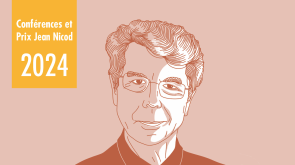
Peter Godfrey-Smith (University of Sydney) winner of the Jean Nicod Prize 2022
Prof. Peter Godfrey-Smith (The University of Sydney), one of the world’s leading experts in the philosophy of biology and philosophy of mind, will be in Paris in June to receive the Jean Nicod Prize 2022.

Peter Godfrey-Smith is Professor of History and Philosophy of Science at the University of Sydney, in Australia. After studying at the University of Sydney and UC San Diego, he taught at Stanford, Harvard, the Australian National University, and the CUNY Graduate Center before returning to Sydney. He has written six books, including Darwinian Populations and Natural Selection, which won the 2010 Lakatos Award, and Other Minds : The Octopus, the Sea, and the Deep Origins of Consciousness, which won the Patrick Suppes Prize in 2019. His most recent book is Metazoa : Animal Life and the Birth of the Mind.
In ancient Greece, the octopus was already said to be intelligent. Could it be that we are not the only species with an inner self ? And if so, is the octopus consciousness of the same type as ours or not ? Pr. Godfrey-Smith will offer his theory in a series of 4 lectures in English on "The Evolution of Experience". They will take place in person only and will be subject to availability at the Ecole Normale Supérieure. The presentation of a health pass will be required at the entrance. Sanitary measures will be detailed later depending on the evolution of the regulations at the ENS.


Biological Explanation and Subjectivity
Presentation of the Jean-Nicod Prize and cocktail after the conference
Tuesday 7 June - 2pm
Ecole normale supérieure, Salle Jaurès, 29 rue d’Ulm, 75005 Paris
The first part of this lecture will give an overview of the picture to be developed and defended across all four. My aim is to give an account of the evolutionary history of animals and nervous systems that makes sense of the origin of subjective experience (sentience, phenomenal consciousness). My account has some features of a "how possibly" explanation, but is intended to be empirically motivated. The second part of the lecture begins on some general questions of framing – materialism, monism, multiple realizability, concepts of experience and consciousness – that will continue in lecture 2. The boundaries between major topics do not exactly coincide with the boundaries between lectures, but I will try to ensure that each lecture remains self-contained.
Framework Questions, and a Start on the Evolutionary Sequence
Thursday 9 June - 2pm
Ecole normale supérieure, Salle Jaurès, 29 rue d’Ulm, 75005 Paris
This lecture will be initially concerned with stage-setting, outlining positions on materialism, reductionism, multiple realizability and related topics. It will also look at the mind-body problem itself, and changes in how the problem has been conceived over recent decades. Solving the problem will involve a combination of critical moves that take us away from conceptions of the problem that make it look harder than it really is, and more positive moves bridging an "explanatory gap" that remains after the critical rethinking. In the latter part of the lecture I will start exploring the early history of animal life.
The Evolution of Experience
Tuesday 14 June - 10am
Ecole normale supérieure, Salle Jaurès, 29 rue d’Ulm, 75005 Paris
My account of the biological basis and origin of subjective experience has two elements. Part of the explanation is given in terms of the evolution of agency and subjectivity, as features of the animal way of being, and another part involves some particular characteristics of nervous systems. The evolutionary history of animals functions in my account as a constraint and a resource. I argue that there is probably a broad distribution of subjective experience across different kinds of animals, both past and present, though the usual "yes or no" question will probably have to be replaced in a framework that recognizes gradual change and graded presence. Some specific groups will be discussed, including cephalopods and various arthropods, as well as vertebrates.
Later Stages, Objections, and Alternatives
Thursday 16 June - 2pm
Ecole normale supérieure, Salle Jaurès, 29 rue d’Ulm, 75005 Paris
The first part of the lecture will complete, and summarize, my evolutionary account and the place of subjectivity within animal life. This will include a look at human consciousness, and later stages in the evolutionary story. The rest of the lecture will be concerned with possible objections, alternatives to my view, and my reasons for not following paths seen in other discussions (Dehaene, LeDoux, and others). I’ll also look at radically inclusive views – biopsychism and panpsychism – and at rejections of the possibility of a gradualist account of the origin of subjective experience.
A link to register will be available soon.
Download the programme

Relevant publications
- Metazoa : Animal Life and the Birth of the Mind. Farrar, Straus and Giroux, 2020.
- “Gradualism and the Evolution of Experience,” Philosophical Topics 48 (2020) : 201-220.
- “Evolving Across the Explanatory Gap,” Philosophy, Theory, and Practice in Biology 11 (2019) : 1.
- “The Evolution of Consciousness in Phylogenetic Context,” in K. Andrews and J. Beck (eds.), The Routledge Handbook of Philosophy of Animal Minds. London : Routledge, 2017, pp. 216-226.
- “Mind, Matter, and Metabolism,” Journal of Philosophy 113 (2016) : 481-506.
- Other Minds : The Octopus, the Sea, and the Deep Origins of Consciousness. Farrar, Straus and Giroux, 2016
- “An Option Space for Early Neural Evolution” (G. Jékely, F. Keijzer, and P. Godfrey-Smith), Philosophical Transactions of the Royal Society B, 370 (2015) 20150181



